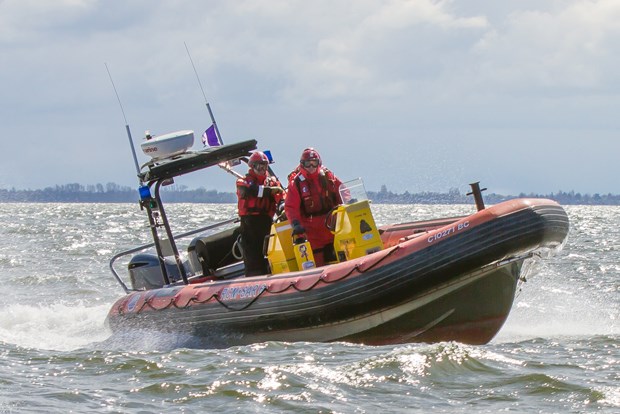|
While cash-strapped, land-based volunteer search and rescue organizations continue their bid to secure more consistent funding from the province, Richmond’s community-run marine rescue group said their funding sources are a different kettle of fish. |
Aarnon Harnden, station manager with Royal Canadian Marine Search and Rescue (RCMSAR), said the main difference is that his organization operates in areas covered by the federal government. The current lobbying effort by land-based organizations, such as North Shore Search and Rescue (under the umbrella of the B.C. Search and Rescue Association), come under provincial jurisdiction.
However, Harnden said his group, which has between 30 to 40 certified marine rescue trained volunteers that, on average, respond to 60 incidents annually, will be watching the provincial involvement in funding volunteer search and rescue closely.
Right now, RCMSAR’s funding comes from a mixture of sources.
Of the roughly $40,000 to $50,000 that’s needed to keep operations going about a third comes from federal coffers — the Coast Guard — which pays for fuel costs mostly used during training sessions.
When they are specifically tasked to play a role with the Coast Guard, Ottawa also foots the fuel bill. Provincial funding, in the form of gaming grants, amounts to about another third. And the remainder is made up by independent fund raising efforts, such as RCMSAR’s second annual event held Sept. 12 at Britannia Heritage Shipyard’s Seine Net Loft that brought in around $9,000, about double of last year’s total.
Harnden said his group is always on the lookout for new funding opportunities and one of the plans being considered is expanding the fundraising night into two separate events.
“We also look at ways of raising awareness of what we do,” he said, adding that can open up windows to private funding through donations — which can be made on their website at rcmsar10.org — as well donations from corporate groups.
Harnden added volunteer lifeboat groups have been almost a way of life on the west coast for about a century.
But since operating costs generally follow an upward trend, identifying new models for funding is an ongoing task.
Volunteer members of the Royal Canadian Marine Search and Rescue group aboard the Jimmy Ng, one of two rescue boats that operate in waters around Richmond.



